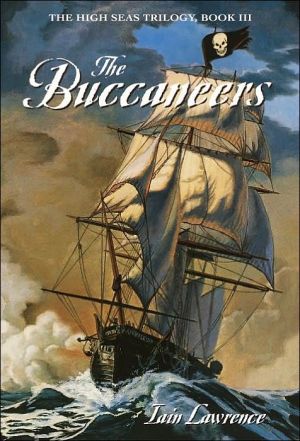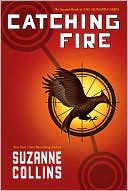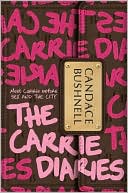The Buccaneers
"There’s pirates in the West Indies. Cannibals. They cook you alive," says Mr. Spencer to his son. These words will come to haunt 17-year-old John as he embarks on his first voyage to foreign lands. Carrying cargo destined for Jamaica, John and his crew of the Dragon set off for waters few of them have sailed before. So when they come upon a lifeboat adrift at sea, some are wary of the sailor aboard. Something about his story doesn’t quite make sense. Still, John respects the stranger’s...
Search in google:
"There’s pirates in the West Indies. Cannibals. They cook you alive," says Mr. Spencer to his son. These words will come to haunt 17-year-old John as he embarks on his first voyage to foreign lands. Carrying cargo destined for Jamaica, John and his crew of the Dragon set off for waters few of them have sailed before. So when they come upon a lifeboat adrift at sea, some are wary of the sailor aboard. Something about his story doesn’t quite make sense. Still, John respects the stranger’s awe-inspiring seamanship. With Horn on deck, he feels the Dragon is in the best of hands.But is Horn to be trusted? The answer becomes muddled as the Dragon encounters a very real — and very dangerous — pirate ship. Now John starts to believe his father’s warnings, especially after he becomes stranded on an island reputed to have buried treasure. A place teeming with buccaneers!Publishers WeeklyPW wrote in a starred review, "Packed with as much excitement as its predecessors (The Wreckers and The Smugglers), this High Seas tale offers plenty of full-blooded salty characters, cunning dialogue, surprises around every corner and a classic battle between good and evil." Ages 10-14. (Feb.) Copyright 2003 Reed Business Information.
Chapter 1\ The Lifeboat\ I was steering the Dragon when the lifeboat came into view.\ It appeared ahead, a tattered sail on a sea that blazed with the evening sun. Its canvas bleached to white, its hull bearded with weeds, it looked as ancient as Moses. But it drove into the teeth of the trade winds, beating toward a land so distant that there might have been no land at all.\ I felt a shiver to see such a tiny craft in such an endless waste of sea and sky. We were twenty-one days out of England, a thousand miles from any shore. But even our schooner—a little world for the eight of us aboard—seemed almost too small for the ocean.\ "Sail!" I shouted, and turned the wheel. "Sail ho!"\ The Dragon leaned under her press of canvas. With a boom and a shudder she swallowed a wave in the huge carved mouth of her figurehead. Men stirred from the deck, rising to tend the sails, and the sounds of stomping feet and squealing rope brought Captain Butterfield up from below.\ The sun glinted through his graying hair and onto the pink of his scalp as he stooped through the companionway. "What's the matter, John?" he asked.\ "A boat, sir." I pointed forward.\ He'd brought his spyglass, and he aimed it at the distant lifeboat.\ "How many people?" I asked.\ He took a moment to answer. "None," he said.\ "That's impossible," I told him.\ He lowered the glass, wiped his eye, and looked again. The long lens stayed perfectly still as his arms and his knees bent with the roll of the ship. Then he brought it down and shook his head. "Look for yourself."\ He traded the glass for the wheel, and it was all I could do to keep that glass aimed at the lifeboat. But I had to agree: there seemed to be no one aboard.\ "Can we fire a gun?" I asked.\ "Good thinking, John." He shouted for the gunner. "Mr. Abbey! A signal, please."\ For the first time in our voyage, I was glad we had our four little guns and the little man who worked them, as strange as he was. He stripped the crisp tarpaulin jacket from the nearest cannon, and had it ready to fire so quickly that I realized only then that he'd kept it loaded all the way from London.\ A cloud of smoke barked from the gun. The Dragon shook from stem to stern, and the lifeboat flew from the circle of sea in my spyglass. Then I found it again, and there was a man staring at me, peering past the edge of the sail. He had been sitting to leeward, with that tattered rag of a sail as a shelter from the spray and sun.\ "There, he's seen us," I shouted.\ "And look!" cried Captain Butterfield. "Good heavens, he's turning away."\ It was true. The man had put up the helm of his little boat and it now spun toward the south. As we watched, he eased the sheets and ducked his head as the sail billowed out above him. Then off he went, fleeing as fast as he could from the only bit of help that he had in all the world.\ "Confound him," said Butterfield. "Is he mad?"\ I thought he must have been. I saw his head looking back, turning on shoulders as broad as a bull's. Then, just as quickly, he put his helm over again, and came racing toward us.\ "Heave to!" shouted Butterfield. "Best we let the devil come to us."\ We turned the Dragon into the wind and lashed her wheel. She lay almost dead in the water, scudding sideways as the swells rolled underneath her. The captain and I—like every man aboard—stood by the rail and watched that lifeboat crawl up to weather.\ Its paint long gone, its seams plugged by scraps of cloth, it looked like a feast for the sea worms. Tangles of weeds trailed in its wake; water slopped in its bilge. But the man who sailed it was bronzed and strong, as though he'd set out just the day before to sail across an ocean. An enormous sea chest of polished wood was jammed between the thwarts.\ He brought his boat alongside, cast off his sheet, and dropped the tiller. Then he hoisted that great box onto his shoulder and climbed up to the deck of the\ Dragon.\ "Help him below," said Butterfield. "Give him a meal and a hammock."\ "Aye, sir," I said.\ The men scattered as I went forward, the hands to the sails, Abbey to his gun. Only the stranger was left, sitting astride his chest and looking very much at home. His hair was tarred in a pigtail, and though his skin was deeply tanned, his eyes were a very clear blue.\ "Where have you come from?" I asked.\ "From the sea," he said. And that was all. He came to his feet, towering above me, and glanced up at the topsail, aft to the stern—everywhere but down at his boat, which wallowed in the swells as we left it behind.\ I bent to take the man's sea chest, the finest one I'd ever seen. The rope beckets—the handles—were so elaborately knotted that months of work must have passed in their making. The wood glowed with its warm finish of oil. But I grunted at the weight of it. Though stronger than most boys of seventeen, I couldn't hope to lift that enormous box.\ The stranger laughed and put it up to his shoulder again. The sound that came from inside it—a rumbling and a clinking—made me think that coins and jewels were nested there. Then he followed me down to the fo'c's'le, where I hung a hammock that he climbed into without a word of thanks.\ "Would you like some food?" I asked. "Some water?"\ He shook his head, his eyes already closed. In another moment he was sound asleep, swinging in the canvas as though in the great cocoon of some enormous insect.\ I found a blanket and covered him, then went up to help Mr. Abbey secure the gun. We stretched the tarpaulin jacket in place and lashed it down.\ "There you go," said Abbey, stroking at the cloth, smoothing it over the muzzle. "You rest awhile." He had a habit of talking to his guns, and it always unnerved me. "That will keep you dry, my handsome little man-eater," he said.\ He loved his guns, but I despised them. Their weight made the Dragon roll badly at times, and only batter through waves she would have hurdled without them. But my father had insisted on arming the Dragon, and whether or not to carry guns was the only decision he hadn't left to me. "You're going to the Indies," he'd said. "There's pirates in the Indies."\ I laughed now, to think of that. What a dreadful place the West Indies had seemed from the way Father had described them. He'd filled the waters with sharks and wood-eating worms, the sky with hurricanes that blew all the year round, and the islands with swarms of cannibals. "Yes, cannibals," he'd said. "They cook you alive, or so I've heard. They shrink your head to the size of a walnut."
\ Publishers WeeklyPW wrote in a starred review, "Packed with as much excitement as its predecessors (The Wreckers and The Smugglers), this High Seas tale offers plenty of full-blooded salty characters, cunning dialogue, surprises around every corner and a classic battle between good and evil." Ages 10-14. (Feb.) Copyright 2003 Reed Business Information.\ \ \ \ \ Children's LiteratureAdventure on the high seas with bloodthirsty pirates and buried treasure is sure to pique the interest of the most reluctant reader. Seventeen-year-old John Spencer is on his first voyage to the West Indies, and tales of pirates and cannibals have excited him as well as instilled fear. Twenty-one days out and a thousand miles from England, the Dragon rescues a lone sailor adrift in a boat. The man, Horn by name, tells a strange and haunting story of his ship, The Apostle, being overtaken by pirates and of his flight from terror. The mysterious stranger carries with him a chest in which are replicas in a bottle of all the ships he has sailed on, each of which has met destruction when he was no longer onboard. To John, Horn is a hero of incredible strength and a superb sailor; to others he is a Jonah and should be put off their small vessel. Under Captain Butterfield's orders, the Dragon sails on with Horn onboard but when they come upon the Meridian Passage and her mummified crew, they begin to suspect that Horn is not what he seems. The Dragon is pursued through the Caribbean by the pirate ship; her crew is felled by sickness and death and stranded on an island where a treasure is said to be buried. Written in first person and sprinkled with salty dialogue, this engrossing nautical tale is riveting¾a real page-turner. The third installment of the author's "High Seas Trilogy," this cliffhanging yarn stands on its own. This reviewer will definitely read The Wreckers and The Smugglers, the companions to this adventure. 2001, Delacorte, $17.99 and $15.95. Ages 12 to 16. Reviewer: Beverley Fahey\ \ \ KLIATTTo quote KLIATT's July 2001 review of the hardcover edition: A pirate ship coming toward you on the cover sets the drama for this third action story about teenager John Spencer and his 19th-century adventures, following The Wreckers and The Smugglers. This time, John is on his father's ship, the Dragon, heading to the Caribbean to trade. They sail knowing they are entering the waters where the pirates, the buccaneers, hold power, and they are somewhat fearful. On the journey they come upon a strange man sailing alone in a small boat, and they pick him up. His name is Horn and he is an accomplished seaman, someone they desperately need, yet some suspect the man of treachery, and some think he is a Jonah who will bring them bad luck. The action on the seas is as constant as the waves, and each page is filled with some crisis or mystery. Finally the Dragon and a wiser John return to England only to end up just where the books began, on the Tombstones, where the wreckers are. Lawrence continues his excellent work, with knowledgeable details of sailing ships and sailing practices from what now seems to be an exotic past. The first two books about John Spencer and his sailing adventures have been highly praised and are on the ALA Best Books lists; this one is equally exciting and well written. (The High Seas Trilogy, Book III). KLIATT Codes: J*—Exceptional book, recommended for junior high school students. 2001, Random House, Dell Yearling, 246p., \ — Claire Rosser\ \ \ \ \ Kirkus ReviewsFrom glimpses of Captain Kidd's glittering hoard to an all-too-close encounter with a crew of cockroach-carpeted corpses, young John Spencer's new adventures, in the wake of The Wreckers (1998) and The Smugglers (1999), bring him to the edge of death and glory once again. What could have been an ordinary trading voyage to the West Indies becomes anything but, after John's Dragon rescues a wonderfully able but enigmatic sailor named Horn from a decrepit lifeboat in mid-ocean. Is Horn a Jonah, as the Dragon's one-eyed gunner claims, or a good-luck charm? Even after repeated bouts with wild storms, tropical diseases, sharks big enough to shatter small boats, and a well-armed pirate ship with a mad, brilliant, horribly disfigured captain, the question remains moot, as Horn's seamanship pulls the Dragon out of hot water more than once. In the end, the Dragon does, by the skin of its teeth, arrive safely back to England—but readers have very likely not seen the last of Mr. Spencer. Heavily scented with blood, gunpowder, and bracing sea air, this nautical episode makes riveting reading. (Fiction. 12-15)\ \








